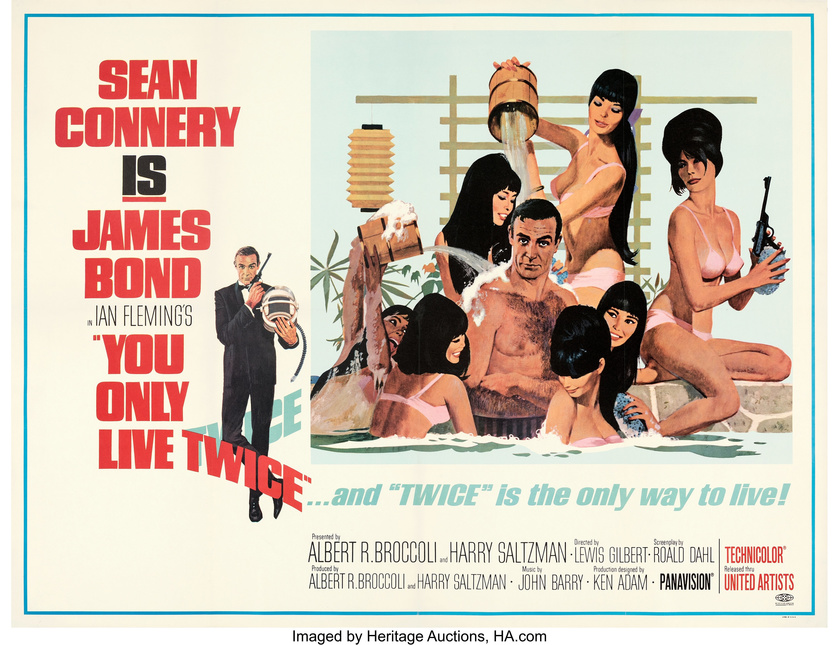For my Sunday spy movie this weekend I watched the classic James Bond film You Only Live Twice, based on the novel by Ian Fleming and adapted for the screen by Roald Dahl.
Yes, that Roald Dahl.
The novel on which the movie is loosely based was the last one published during Fleming’s lifetime, and to be frank it (the book) is terrible. Basically, after the murder of his wife in the previous story Bond is a mess and flubbing assignments. In an effort to get his mind back in the game M sends him to Japan for… some reason. Most of the book is just Bond carousing around the orient with Tiger Tanaka (and running around in yellowface) until he stumbles upon Blofeld, who has set up shop in a castle surrounded by a garden where people go to kill themselves.
Blofeld killed Bond’s wife. Blofeld must be stopped.
Then the novel kicks into high gear and is actually kind of exciting. But it takes a long time getting there, and the evil plot is so silly that even the movie scrapped it. For the film Blofeld has his base in a dormant volcano (which is more plausible, since the Japanese built their castles too far inland for the story to work at all), and is trying to start a war between Russia and the US so that Japan can come in and pick up the pieces. Interestingly, the novel ends with Bond even more lost than he started, amnesiac and on his way to Russia to find himself.
The movie has a happier ending (wink, wink).
But getting back to Fleming and Dahl, both writers were in the news last week. Penguin Publishers recently announced that they were editing the great author’s work to make it more sensitive to modern audiences. So Augustus Gloop is no longer “enormously fat” but just enormous. No one in Matilda reads Rudyard Kipling anymore, and instead John Steinbeck (for now, until he gets canceled). When the news came out I joked, “I can’t wait for them to come for his buddy Ian Fleming.”

And like clockwork, they did.
On Saturday I saw the news sensitivity readers have been hired to remove all the yucky racism from the Bond novels. Again, I was joking. Joking! And yet, here we are. Lest anyone think I’m promoting racism, I’m not. Was Bond a small-minded bigot? Of course he was. Do I cringe when I see it? Of course I do. I want to like the cad, despite myself. But if we’re not allowed to write flawed characters, or reveal our own personal faults in our art, there will be no art. It all has to go.
Let’s be honest, racism is hardly Bond’s biggest problem.
More than the sanctity of art, to go back and amend history or literature is to deny reality. Fleming and Dahl, for better or worse, wrote what they wrote. We can wrestle with that as we will, but to deny that it ever happened is a fatal mistake. Would we rather be offended or go traipsing down the path to madness? Because anyone who says that something that is real is something else is certainly insane.
We can’t change the past and we shouldn’t pretend that we can.
As David Burge said on Twitter, “Here’s an idea: instead of making sure old books are ‘suitable for modern readers,’ how about making sure modern readers are suitable for old books?” To live in reality requires thick skin and confronting ideas that make us uncomfortable. Demanding the creation of bubbles where we never have to see anything we don’t like is to have an incomplete life.
We should also remember that arbitrary rules mean that no one is safe.
Andrew Klavan puts it better than I could: “This cultural vandalism is the work of troglodytes. Leftists who say it's ‘legal’ or it's ‘capitalism,’ are buffoons. They're like the guys who open the gates to let the barbarians in because they've been promised they'll be spared.”
Maybe we just leave the artists alone.
Didn’t the Greeks believe that art came from someplace divine? I’m not saying that that racism in a James Bond novel is inspired by God, of course. But I am saying that it’s woven into western thought that the work of an artist is more than content that can edited willy-nilly and that’s a respect that we’ve lost in our disposable culture. It used to be that those who couldn’t create became critics. Now they’re “sensitivity readers.” At least the former confronted what they didn’t like, instead of marring it.
It’s easier to tear down than it is to build. More fun, too.
So what’s the artist to do in this climate? Just keep going. Fearlessly. Whatever we make could be offensive to someone, someday. There’s just no telling. The truth will always offend, but it will make the world a better place.

























